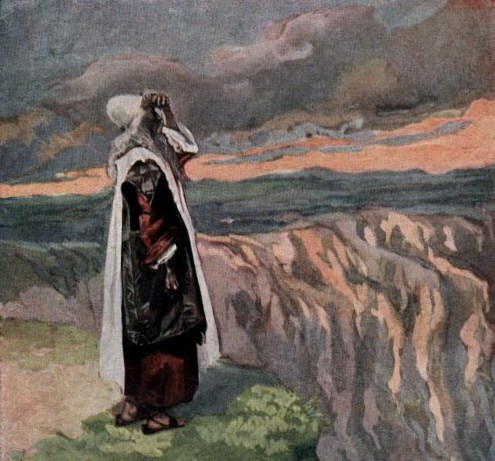Torah Pearls – Pinchas – Numbers 25:10-30:01 – Nehemia Gordon & Keith Johnson
What is the qualification of the firstborn? Who inherits the land if a father has no sons but only daughters? Did Pinchas impale a princess of Midian? A double portion or two thirds – what did it mean for Moses to impart some of his glory to Joshua, or Elijah’s spirit to Elisha?
Join us for this year’s Tanakh Tour of Israel!
[karma_by_kadar__simple_player title=”Truth2U” src=”https://truth2u.org/wp-content/uploads/Audio/Truth2U%20-%20Nehemia%20&%20Keith%20-%20Pinchas.mp3″ volume=”0.9″ autoplay=”true” downloadable=”true” color=”1″]
[wp-post-slider]





According to all accounts, Elisha didn’t get a double-portion (after the misunderstood meaning of “double-portion” in many Christian circles, at least)… so, was it just a coincidence that it seemed Elisha did twice the miracles Elijah did? Elijah raised someone from the dead; Elisha raised two (including the one raised when his corpse was thrown into a cave where Elisha’s bones were) ?
I haven’t studied this IN DEPTH (I study other things); so forgive any mistakes.
Hi Jono,
I love this program. Thank you!
Where do you get the awesome artwork for each series? I studied art in school and I was never exposed to these. This is not such a huge surprise, my university was opposed to anything of God. Where did you find them? Thank you for finding them! It’s such a blessing to see work like this!
Shalom,
Nickie
G’day Nickie,
Thank you for your encouragement!
I usually source the artwork from Wiki. I particularly like Tissot.
Awesome Episode!! Thanks Jono, Nehemia and Keith!
I would have to go with Nehemia and with Keith’s Rabbi on the Moses incident, I would tend to believe that he struck the rock as a result of human weakness and not out of rebellion.
I think we can all relate to loving the instructions of the Torah yet under individual circumstances and weakness may fail to carry them out as our hearts would desire.
Mat 26:41 Watch and pray that you may not enter into temptation. The spirit indeed is willing, but the flesh is weak.”
I always loved this Torah portion because Yehovah said
inheritance would be given to the daughters when there was no sons.
Thanks for sharing about the 2/3rds of a shekel.
What a blessing to study with all of you and learn so many things I didn’t see before.
I received Nehemia’s new book and couldn’t put it down. I could relate to many of Nehemia’s stories from my own life and I both laughed and cried.
Another Great Torah Pearls Portion!
Loved the double portion-2/3 portion explanation.
Can you write out the Hebrew prayer from the Psalms for me?
Thank you, gentlemen, for discussing for our benefit this Torah Parshah. I awaken every Thursday hoping to see the Truth2U.org email with links to Torah Pearls and Yoel’s commentary on Judges. What a blessing. If I may make one suggestion, please have Keith and Nehemia not skip over the sacrifices. I realize that to some it is like reading another census or genealogy. I can hear them say, “Please! Can we get on with it already? There has got to be some juicy parts up ahead.”
I have been trying to make sense of the sacrifices for decades. Who sacrifices what , when, where, how, and why. Sacrifices are central to the Torah and the prophets and beyond. The first direct mention of a sacrifice is Qayin’s minchah (grain) sacrifice followed by Hevel’s lamb and minchah offerings. Does not Isaiah say that I will be able to offer a sacrifice in the olam haba if I honor His Shabbat and covenant? I would like a detailed discussion of the subject. And, Keith, if I were able to understand the sacrifices by doing a word search, I would not need to listen to this program.
I would like to echo Jono’s words to y’all: Be blessed, be set apart by the truth of our Father’s words.
Shalom!
Yeshua is my Rabbi also.
Can you please tell me if Numbers 28:26 is referring to the Day of First Fruits or Shavuot as a Sabbath day? The way it is worded in English is confusing because it says on the day of first fruits when you bring your new grain offering; then it says when your weeks (be out), is to be a holy convocation/no work. I know according to Lev. 23 Shavuot is to be a Sabbath..so basically I’m trying to figure out if this is saying that First Fruits is to be a Sabbath day as well. Thanks.
” the spirit is willing but the flesh is weak ” Matt. 26:41
This is a direct quote from Y’shua Ha-Mashiach in the Garden of Gethsemane
when He returned from praying to find His disciples asleep.
[Note: I am cross-posting here, from Nehemia’s Wall, as there seems to be more discussion traffic here. -neville]
I really love listening to the Torah Pearls. Not only do I enjoy the attitude of respect and friendship exhibited between Keith, Nehemia, and Jono, and the insights brought forward on the scripture, but your good-natured banter often gives me a laugh as well.
In the discussion of portion “Pinchas”, at one point Nehemia made reference to 2 Kings 2:9, which is usually translated with Elisha’s request to Elijah: “give me a double portion of your spirit”. Nehemia explained that the Hebrew word translated as “portion” is the work “peh” (“pi” , perhaps ??), and that an archaeological find had identified that word as a measure of “a third” (of either a shekel, or of a talent, the former being quite small, and the latter quite large). His conclusion was that Elisha’s request was for “two thirds of your annointing/spirit”.
I have only begun to try to study Hebrew word meanings, and largely as a result of listening to the Truth2U podcasts of Torah Pearls, so I do not claim to be any kind of expert at this. However, with the exception of references to Heinrich Ewald’s casual comments in a footnote to his “History of Israel”, I have not found any other source (besides Nehemia’s comment) indicating that “peh” means anything other than “mouth” or “mouthful” (and thus, the “double mouthful” or “double portion” translation and the generally accepted “give me your annointing as if I was inheriting it as your first-born son” interpretation.
It seemed that Nehemia was saying that the Hebrew was considered unclear until the archaeological discovery of the measuring device, but I did not uncover any other reference to a confusion. Every reference I found to the Hebrew described “peh” as literally meaning “mouth” or “mouthful”. (such as: http://www.blbclassic.org/lang/lexicon/lexicon.cfm?Strongs=H6310&t=KJV )
Can you elaborate further on why you believe the 2 Kings 2:9 passage was not a request for Elijah’s annointing as a spiritual inheritance?
Thank you in advance for your comments.